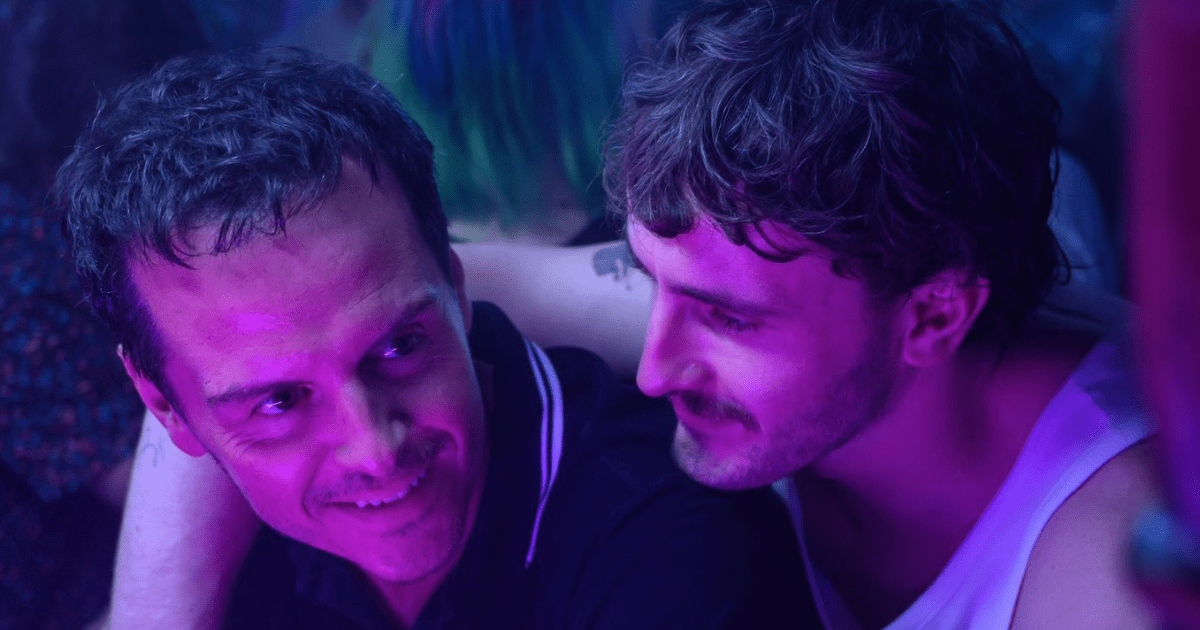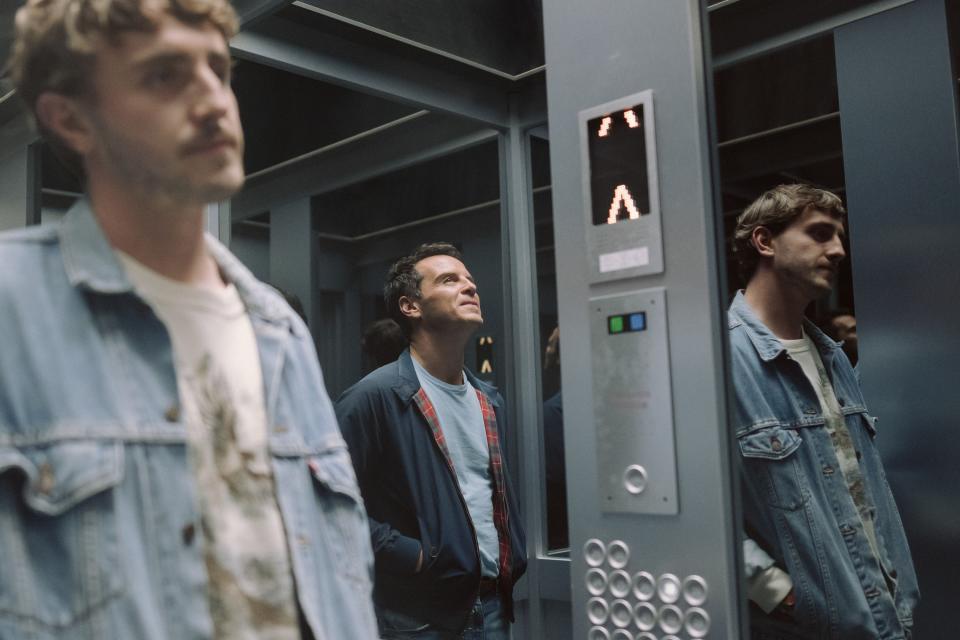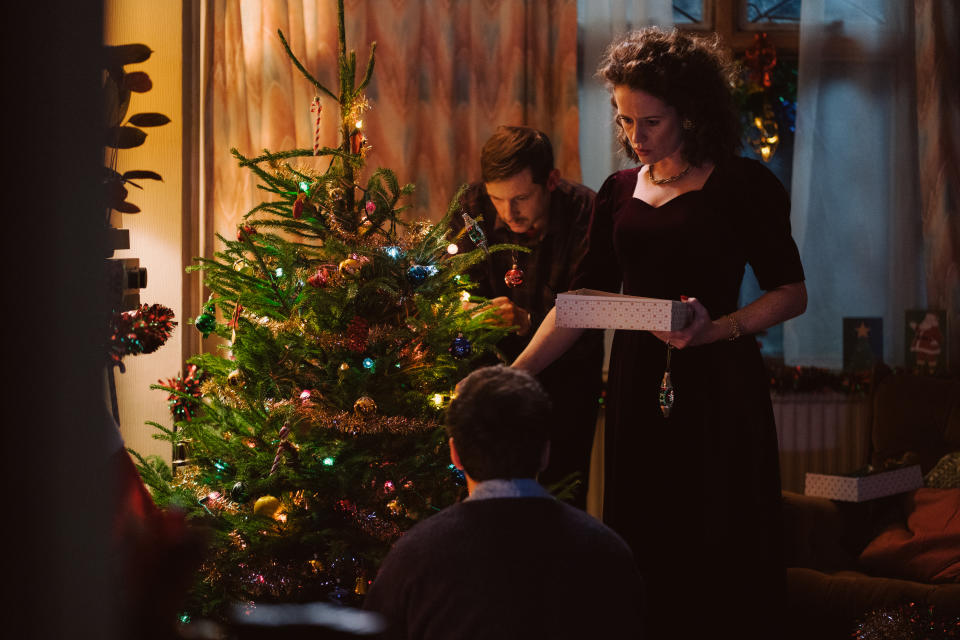‘All of Us Strangers’ Review: Andrew Scott Comes Out to His Dead Parents in an Emotionally Shattering Ghost Story

- Oops!Something went wrong.Please try again later.
- Oops!Something went wrong.Please try again later.
- Oops!Something went wrong.Please try again later.
- Oops!Something went wrong.Please try again later.

Editor’s note: This review was originally published at the 2023 Telluride Film Festival. Searchlight Pictures releases the film in theaters on Friday, December 22.
God bless British Andrew Haigh, whose best films — “Weekend,” “45 Years,” and now the quietly shattering “All of Us Strangers” — are the rare work of a modern director who knows how to get out of their own way. Haigh’s simple but penetrating dramas couldn’t be more specific in how they depict the strangeness of intimacy and the intimacy of strangeness, and yet they’re also palpably unfilled in a way, like a half-empty room that someone you were looking for just left. In that light, it should come as little surprise that Haigh is so well-suited to an ineffably personal ghost story about the absences that can shape our entire lives if we let them.
More from IndieWire
Based on a 1987 Taichi Yamada novel that Haigh’s adaptation has tenderly queered in a way that resonates with his own experience, “All of Us Strangers” begins with a premise so poignant that even the slightest miscalibration could make the whole thing ring false. Andrew Scott of “Fleabag” fame stars as a lonely gay screenwriter named Adam, who’s all too at home in the eerie new London high-rise where he seems to be one of the only two residents. And wouldn’t you know it, the other renter — Harry — looks an awful lot like Paul Mescal, who plays the part with a sex-forward puckishness that disguises the same pain that it advertises with every glance (no actor on Earth is as good at selling an open wound). A drunken Harry makes the first move by knocking on Adam’s door one night, a rejected advance that nevertheless sets the stage for a romance that finds both men letting each other in to one extent or another.
So that’s Adam’s nightlife sorted. Meanwhile, a glimpse at the flashing cursor on his computer screen — “Ext. Night. 1987” — is all the context we need to understand what he’s doing with his days: writing a screenplay about coming of age as a closeted tween in the suburbs outside London. By the same token, it’s immediately self-evident that Adam is traveling back in time whenever he visits his old stomping grounds outside of Croydon for research, with the train there serving as a portal to the past.

When Adam bumps into his long-dead father on one of those trips, his dad — a mustached Jamie Bell, his stirring performance made all the more powerful by the fact that he’s almost a decade younger than Scott — casually leads him back to his childhood home as if he and Adam’s similarly late mom (Claire Foy) were expecting him for dinner. They know they haven’t seen their son in more than 35 years, and, to some unspoken extent, they seem to know why, but speaking it aloud might threaten to break the spell of a film whose lo-fi approach to the afterlife cleaves much closer to the plaintive wistfulness of Hirokazu Kore-eda’s “After Life” than it does the violent sentimentality of “Field of Dreams.”
Which isn’t to suggest that “All of Us Strangers” isn’t a nuclear-grade tearjerker, because it is most definitely that, especially once Adam’s burgeoning relationship with Harry begins to compound the one he resurrects with his parents. But Haigh tells this potentially maudlin story with such a light touch that even its biggest reveals hit like a velvet hammer, and his screenplay so movingly echoes Adam’s yearning to be known — across time and space — that the film always feels rooted in his emotional present, even as it pings back and forth between dimensions.
Smoothed over by spectral sound design and the haunted refrain of Frankie Goes to Hollywood’s “The Power of Love,” that perpetual nowness invites a fascinating conversation between the different eras, as Haigh delicately untangles the knotted threads that connect Adam’s loneliness as a closeted tween at the height of the AIDS epidemic to the self-imposed isolation he suffers as an adult in the 21st century. One scene might find Adam debating the merits of “queer” vs. “gay” with Harry in 2023, while the next watches him coming out to his dead parents in 1987, the difficulty of that admission softened by the fantasy of finally being able to make it.

At the same time, “All of Us Strangers” is as much of a lament for the present as it is for the past, and while Adam assures his mom and dad that “Everything’s different now,” Harry — despite his comparatively outgoing persona — offers a heartsick reminder of how deep certain fissures can cut across a family. People are products of their time, and yet the fear of vulnerability is universal. Cosmic. Interstellar. And so Haigh, in rather overt terms, slowly begins to recontextualize Adam’s sexuality as more of a conduit for his despondency than a root cause, leveraging a personal story about the consequences of keeping pain out into a primordial one about the catharsis of letting it in (a dynamic reflected by Haigh’s decision to have Adam’s parents live in his actual childhood home). Adam doesn’t have to open the door himself, he just has to lower the latch.
The film’s hushed modesty allows Haigh to create an ethereal atmosphere so cold and sterile that Adam and Harry might as well be the last two men on Earth; the fire between them is kindled with such care that it seems like the entire world might go dark if it went out. That heightened focus draws our eye to every muscle of Scott’s crushingly gentle smile, as we search for a lifetime of unspoken feeling in each little twitch of his lips. Adam’s mom confesses that she never knew what her son was thinking or why he would run away from home, and so Haigh entreats us to seek the answers for her.
But we’re also meant to be double agents of a sort, as we join Adam in his desire to know the parents who went out for a short drive one Christmas Eve and never came back. There are no shattering revelations to be had on that front, nor any melodramatic histrionics in the various scenes where these characters all sit across from each other and compare notes, but the generosity of spirit that Adam shows to his dead parents is almost as profoundly beautiful as the generosity that he wrests for himself in return.
And Haigh, whose less is more approach has never been more effective than it is here, always makes sure to leave room in the frame for us to bring our own hurt to the table, whatever form it might take. “I know how easy it can be to stop caring about yourself,” Harry tells Adam at one point. “All of Us Strangers” does too, and it never shies away from how hard it can be to start again, especially once Harry begins to struggle with his own advice. But even this bittersweet film’s most soul-flattening moments find something transcendent in the simple fact that none of us is ever truly alone so long as we still have our ghosts for company.
Grade: A-
“All of Us Strangers” premiered at the 2023 Telluride Film Festival. Searchlight Pictures will release it in theaters on Friday, December 22.
Best of IndieWire
Sign up for Indiewire's Newsletter. For the latest news, follow us on Facebook, Twitter, and Instagram.

